Nigeria
The Afrobeats sound everywhere in Africa and now in the West, where the youth sway to the lively rhythms of Burna Boy, Wizkid, and Tems. But as Nigeria's presidential election approaches, the pop stars are keeping quiet.
Africa's most populous nation, which will elect a new president on Feb. 25, is often reduced to the insurgency of Boko Haram and jihadist groups that plague the northeast, but Nigeria is also the continent's largest economy and the birthplace of a music genre that is setting the world on fire.
Afrobeats stars are winning Grammys (Burna Boy, Tems), filling the biggest concert halls in the world (Wizkid, Davido), exploding the Tik Tok view counters (Rema, CKay), and collaborating with North American celebrities like Chris Brown, Justin Bieber or Drake.
These celebrities are as much adored as the elderly Nigerian political elite is hated. Politicians, whose corruption is almost endemic, are seen as responsible for the country's dysfunction: lack of schools, electricity, doctors, etc.
For this presidential election, where 40% of registered voters are under 35, the candidates of the two main parties are old guard: Bola Tinubu of the ruling APC is 70 years old and Atiku Abubakar of the main opposition PDP is 76.
"The singers have enormous power over the youth, which the candidates don't have," says music journalist Oris Aigbokhaevbolo. But "they do everything to avoid any connection with politics, especially during the presidential election.
Afrobeats was born in the 2000s from a mixture of, among other styles, the Afrobeat (without s) of the legendary Fela Kuti, a musician who fought against corruption all his life, and the influence of hip-hop from the United States.
"The first artists were quite political, but when the genre started to make a lot of money, the lyrics became smoother," says Aigbokhaevbolo.
Until recently, the songs were mostly odes to "Naija" capitalism, celebrating success, big cars and female conquests, or somewhat cheesy declarations of love.
But a historic youth protest movement that broke out in October 2020 "gave a new dimension" to the genre, according to the journalist.
- Political awakening -
As thousands of young people took to the streets to protest police violence and bad governance, Afrobeats stars suddenly came out of the woodwork, posting their support on social media and more.
Burna Boy bought huge advertising spaces to display the slogans of this movement ("EndSARS"). Davido led a demonstration in the capital Abuja, where he knelt down in front of the police, and Wizkid harangued a crowd of Nigerians in the diaspora in London.
After the bloody repression of the movement, many artists paid tribute to the victims, like Burna Boy with his song "20.10.2020", the date when the army shot at demonstrators in Lagos.
But since then, silence has become the rule. "You don't hear them," says Osikhena Dirisu, program director of The Beat radio.
Neither when it comes to supporting voter registration campaigns, nor to supporting a particular candidate.
"I'm disappointed, they mobilized us during EndSARS, and now none of them are calling on young people to go out and vote, or to support Peter Obi, the youth candidate," says Ifiy, 30, who supports the outsider in this presidential election.
The 61-year-old former governor, who is supported by a section of the youth and the EndSARS movement, has emerged as a credible challenger to Tinubu and Atiku.
But apart from P-Square, the twins who wrote hit songs in the 2010s such as "Alingo," superstars who have shown their support for Obi are rare, according to Dirisu.
Celebrities don't get involved in politics much, "because in Nigeria it's better not to be an enemy of power," according to Aigbokhaevbolo.
On the other hand, politicians need Afrobeats: "An election campaign without music is just unimaginable.
So, in the meetings, the speakers spit out the hits of the moment, most often used without any rights. The catchy refrains allow to warm up the supporters or the crowds of indigents paid to fill the stadiums before the candidates arrive.
Music also helps to humanize and even rejuvenate the candidates, like Tinubu who created a buzz during his campaign by dancing to Kizz Daniel's hit "Buga".
Finally, artists who are unknown internationally and who struggle to monetize their music are often paid by the parties to sing at these meetings, such as Portable for the ruling party or Timi Dakolo for the opposition.
Criticized on social networks, the two artists said they take the money ... where it is.



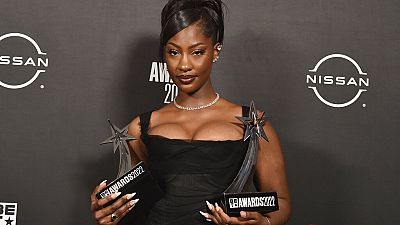

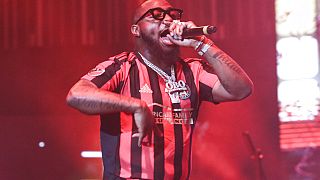
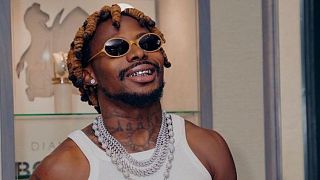

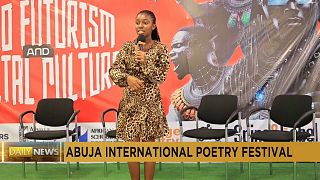
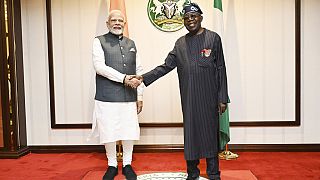



01:40
Kenya cancels airport and energy deals with Adani group after the U.S. indicts the tycoon
Go to video
Fugitive Zambian MP Emmanuel Jay Banda arrested in Zimbabwe after three-month Manhunt
Go to video
Spain to offer residency and work permits to undocumented migrants
Go to video
Archbishop of Canterbury will end official duties in early January amid sex abuse scandal
Go to video
Congo opposition leaders call for protests against president's plan to change constitution
01:30
Mali: Former al-Qaida-linked police chief sentenced to 10 years for war crimes